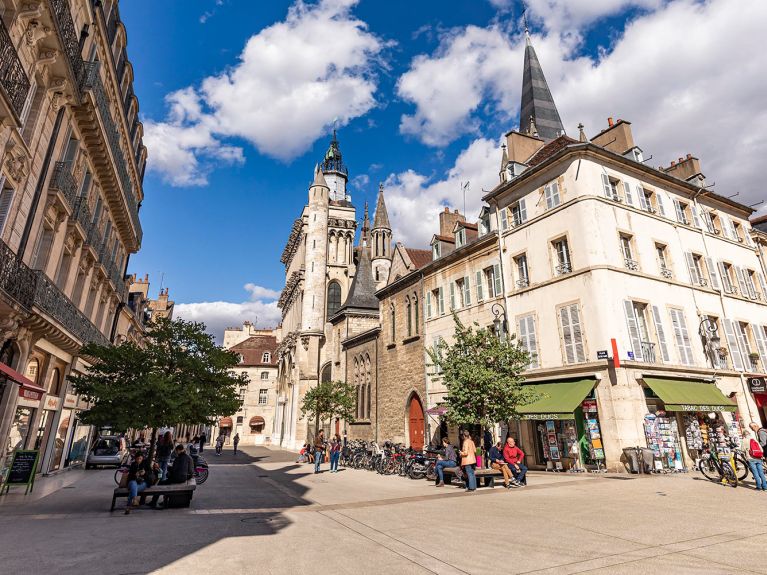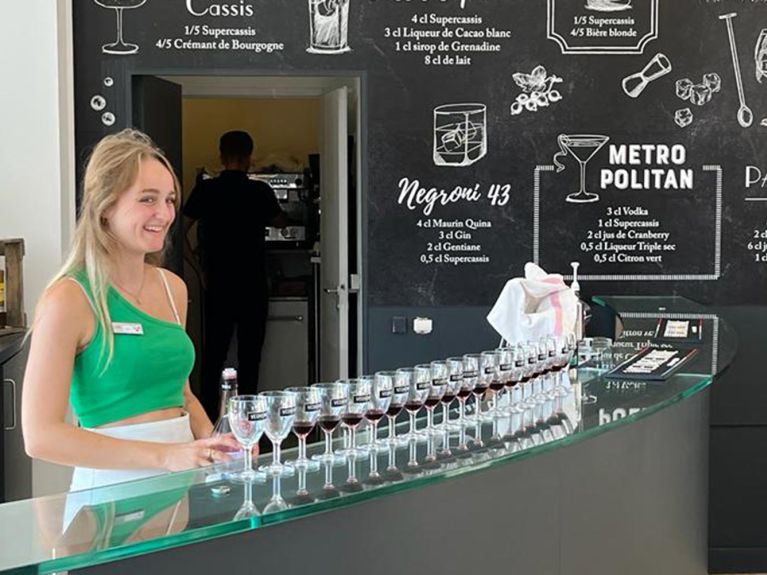The pioneers of partnership
Rhineland-Palatinate and Burgundy already entered into a twinning agreement before the Élysée Treaty. Young people are still benefiting from it to this day.

Anna Keller had never planned to embark on a three-month internship at a blackcurrant museum. That’s hardly surprising: “I wasn’t even aware that anything like that existed,” laughs the 19-year-old from Speyer. During the summer of 2022 she took groups of visitors on tours in French, English and German of the museum and neighbouring liqueur factory in the French town of Nuits-Saint-Georges near Dijon in Burgundy. She also ran the tastings and advised customers on what to buy. “I had a really good time and learnt a lot,” Anna recalls. Before starting, she had no particular expectations of her stay in France. “I just decided to go there and see what it would be like.”

An agreement that pre-dates the Élysée Treaty
Her internship was possible thanks to the twinning agreement between the state of Rhineland-Palatinate and the French region of Burgundy, which since 2016 has been part of Bourgogne-Franche-Comté. Twinning agreements between German and French regions and towns have long been ubiquitous, yet more than 60 years ago Rhineland-Palatinate and Burgundy were pioneers when they signed the first partnership between a German federal state and a French region on 26 June 1962. Just half a year later – on 22 January 1963 – Germany and France concluded the Elysée Treaty, which is seen as a milestone in the reconciliation and friendship between the two neighbouring countries. There has even been a city twinning agreement between Mainz, the state capital of Rhineland-Palatinate, and Dijon, the capital of the Burgundy region, since 1958.
The twinning agreement between the two regions also gives young people from Burgundy the chance to spend time in Rhineland-Palatinate. “I wanted to have some new experiences,” says Cyprien Collas, who worked at the Ludwigshafen branch of a motorcycle manufacturer in the spring of 2022. The internship was a compulsory part of the business administration degree course that the 20-year-old from Besançon is doing. He helped advise customers and also took part in a meeting of the motorcycle community. “It was very interesting to discover how business administration actually works in a real-life company,” he says, adding that motorbikes are his great passion. The fact that his boss was also French made it easier for him to adapt to the work.
Collaboration in everything from business to culture
The collaboration between Rhineland-Palatinate and Bourgogne-Franche-Comté encompasses everything from around 100 school partnerships and Franco-German degree courses to support for companies keen to forge business contacts. Since the 1990s, the Haus Burgund in Mainz and the Maison Rhénanie Palatinat in Dijon have served as points of contact and official representations of the regions; one of their jobs is to arrange internships for those aged 18 to 30. They help the young people to find not only a suitable internship place, but also accommodation.
According to Haus Burgund, around 1,400 young people in both countries have applied for an internship abroad since the programme was set up – on average 30 per year. Yet that is not all: in Rhineland-Palatinate for example, Haus Burgund organises concerts by musicians from the French partner region, as well as an annual Burgundy Market in Mainz city centre featuring specialities from the French region.
Cooperation between the regions has been stepped up time and again in recent years. For instance, there has been an artists’ exchange programme since 1995, which in 2002 was also put on a contractual footing. It provides scholarships that enable artists to work in the partner region. The scholarship was widened in 2005 to include writers. And in 2014 the two regions – both of which are renowned for their wines – decided to collaborate in the area of winegrowing.
My internship ended in August, but by September I was already back in the area to visit friends.
Most importantly, however, all the programmes make exchange possible between citizens, and especially between young people. Anna from Germany and Cyprien from France have happy memories of the time they spent in the neighbouring country. Anna for example is glad that her French has become more and more confident: “At first I was rather hesitant about doing tours in French.” That’s why she initially talked only to groups of two. “By the end, I was doing tours for 20 to 30 people. When you are forced to speak the language, your fluency quickly improves,” she says. “You just have to embrace the adventure.” Cyprien experienced much the same thing. He says that he had problems with German expressions at first, but over time found it easier to speak German.
Both also made friends during their time in the neighbouring country, which keeps them connected to the partner region. Cyprien for instance is still in touch with people in Rhineland-Palatinate, especially with his flatmates in Ludwigshafen. When he completed his internship, he stayed on for the summer to work as a mechanic – ultimately spending five months in Rhineland-Palatinate. Though Anna went straight back to Germany, she quickly returned to France: “My internship ended in August, but by September I was already back in the area to visit friends.”


